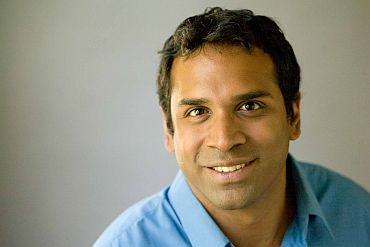 New York City has settled a case by Ravi Shankar, associate professor of English and poet-in-residence, Central Connecticut State University, for wrongful arrest and detention last year.
New York City has settled a case by Ravi Shankar, associate professor of English and poet-in-residence, Central Connecticut State University, for wrongful arrest and detention last year.
Shankar was arrested on July 10, 2009, when he was returning home after a party in Manhattan. After he took what he later learned was a legal turn onto Sixth Avenue from 34th Street, the police stopped him. He passed a breath analyser test to check if he was drunk.
Yet, the police put him against a wall and handcuffed him. When he was pushed inside a police car, one officer commented, "It's always a good day when you can bag a sand nigger."
 |
Shankar filed a lawsuit demanding $10 million as compensation from the city and the police department.
The city settled with Shankar last month during the discovery phase of his trial.
"We are very pleased to have gotten justice for Ravi," Shankar's lawyer, Bruce Barron said.
The settlement prohibits Shankar from revealing the amount he received. But it was not a life-changing amount, Shankar told India Abroad.
More than the money, he felt that the authorities admitted their mistake.
He said he may have got more money had the trial proceeded. But he was reluctant to spend time and money on prolonged litigation. Moreover, he would have to travel from his home in Chester, Connecticut, to New York City frequently for the case.
"Seeing media reports, Baron agreed to take on the case pro bono. He agreed that the travesty of justice was unconscionable and agreed to represent me for free, taking only a cut out of the settlement he might procure," Shankar said.
Since the incident, Shankar has been involved in activism and raising awareness. He writes op-ed pieces and poems to speak for justice.
He has also filed a complaint with the New York City Civilian Complaint Review Board, an independent organisation that investigates complaints against the NYPD.
Washington, DC-born Ravi Shankar is the founding editor of the international online journal of the arts, Drunkenboat.com. He has published a book of poems, Instrumentality, which was named a finalist for the 2005 Connecticut Book Awards, and with Reb Livingston, a collaborative chapbook, Wanton Textiles.
'I'm still a little paranoid'
I must say that since the experience I have found that I'm a little paranoid. A case in point: just a few months ago I was driving on the highway when a state trooper pulled behind me. I had done nothing wrong, was under the speed limit, yet subconsciously, I pulled off at the first exit and re-entered the highway. I didn't even know what I was doing consciously but when I reflected I realised that what happened to me had affected me far deeper than I could even begin to imagine, Shankar said.
"I feel more afraid of figures of authority, am loathe to engage the police, even when they might be helpful, and I feel a sense of distrust and anger about policeman that is hard to logically rationalise.
I am an American citizen born in Washington, DC, and have lived most of my life in the United States. To feel like I don't have the rights and liberties of the rest of my country-people has been a shock to me and I want to advocate on behalf of all of those who are wrongfully attacked and impugned by those in power." Shankar added.
Really I felt let down by every level of the justice system -- from the clearly racist cops to the judge who wouldn't let me use the public defender who had been assigned to me. I feel racism is institutionalised and that those who are not white -- be they black, Asian, Hispanic or Arab -- have more in common with one another, especially in this post-9/11 environment, than they might have ever imagined.
My eyes have been opened and I've been severely let down by any notion of the American dream. Generally, the college and community, knowing me as a well-respected member of the community, was quite supportive though I must admit that some of my friends thought my claims were overreaching, or rather the idea that I was suing the city was absurd, Shankar said.
I got quite a few comments that it was too bad that I hadn't been sodomised by a police truncheon or beaten up worse, as that would have given more credence to my case. As if such indignities need to be experienced in order to get justice!
All were in agreement that I had been trammeled unfairly but what was news to me was what someone from ABC News who had been considering carrying the case said to me. Apparently such violations and racism happen so frequently in NYC that it's just not news and again, I would have had to have something broken or been maimed for them to run a piece on it. It was quite demoralising to hear, he added.
My family's response, as you might imagine, was mixed. My Amma was scandalised that I would even write about my experience due to her sense of familial shame. What if your colleagues hear about this, she asked me? Why would you embarrass yourself further by making noise about this? She agreed that I had been trespassed against, but in her judgment, one should keep quiet in such circumstances lest even greater harm befall him.
She actually thought I might be stalked or pursued further by the police. A cousin works for the Department of Justice and was very glad I had written about it and told me that since my civil liberties were trampled upon, I could start a federal inquiry into police abuse in the NYPD, he added.
Image: Ravi Shankar







 © 2025
© 2025